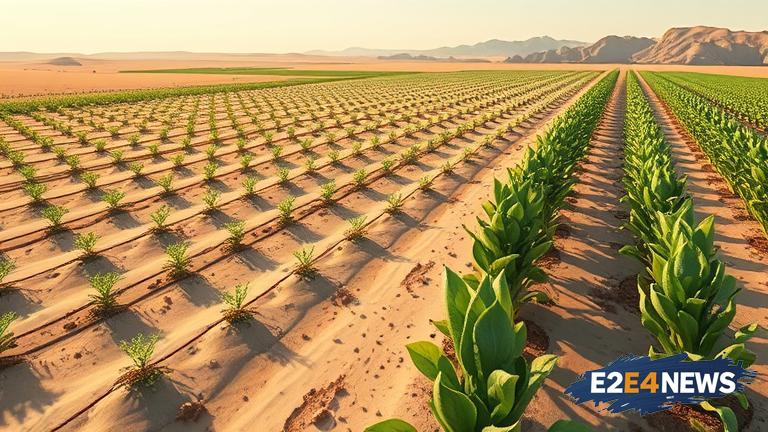Israel, a country known for its innovative approach to agriculture, has been making significant strides in desert farming. The country’s agricultural sector has been working tirelessly to develop and implement new technologies to increase crop yields and reduce water consumption. One of the key techniques being used is precision agriculture, which involves using advanced sensors and drones to monitor and control crop growth. This approach allows farmers to optimize water and fertilizer usage, resulting in higher yields and reduced waste. Another technique being employed is hydroponics, a method of growing plants in nutrient-rich solutions rather than soil. This approach not only conserves water but also enables farmers to grow a wide range of crops in areas with poor soil quality. Israel’s desert farming initiatives have also been focused on developing new crop varieties that are more resilient to drought and extreme temperatures. For example, scientists have been working on developing new strains of wheat and barley that can thrive in arid conditions. These efforts have been paying off, with many farmers in the region reporting significant increases in crop yields. The use of advanced irrigation systems has also been instrumental in boosting crop production. These systems use advanced sensors and software to optimize water distribution, ensuring that crops receive exactly the right amount of water at the right time. In addition to these technologies, Israel has also been investing in research and development to improve its desert farming capabilities. The country has established a number of research centers and institutes dedicated to studying and improving desert agriculture. These centers are working on a range of projects, from developing new crop varieties to improving irrigation systems. The impact of these initiatives has been significant, with Israel’s agricultural sector experiencing rapid growth in recent years. The country’s farmers are now able to produce a wide range of crops, from fruits and vegetables to grains and legumes. The use of advanced technologies has also enabled farmers to reduce their environmental impact, with many farms now using renewable energy sources and reducing their water consumption. As a result, Israel’s desert farming sector is not only boosting crop yields but also helping to protect the environment. The country’s innovative approach to agriculture has also been attracting international attention, with many countries seeking to learn from Israel’s expertise. In fact, Israel has been sharing its knowledge and technologies with countries around the world, helping to improve agricultural productivity and reduce poverty. The potential for desert farming to address global food security challenges is significant, and Israel’s initiatives are paving the way for a more sustainable and productive agricultural sector. With its innovative approach and commitment to research and development, Israel is poised to remain a leader in the field of desert farming for years to come. The country’s agricultural sector is expected to continue growing, with new technologies and techniques being developed all the time. As the global population continues to grow, the need for sustainable and productive agricultural practices will only continue to increase, making Israel’s desert farming initiatives more important than ever. In conclusion, Israel’s desert farming sector is a shining example of innovation and sustainability, and its impact is being felt not only in the country but around the world. The use of advanced technologies, precision agriculture, and hydroponics has enabled farmers to boost crop yields and reduce their environmental impact, making Israel a leader in the field of desert farming.
